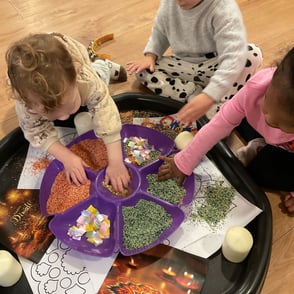What is my child feeling? What makes them happy? What makes them sad, or scared, or excited? Good communication is pivotal in ensuring that you are able to understand your little one, and foster a strong connection and healthy relationship.
From getting down to their level to using the appropriate vocabulary, how do you as a parent ensure that you are effectively communicating? Today, we will be offering our top tips and advice on engaging with your child, so that you never have to guess what is on their mind!
1. Be Direct, Not Difficult
Research has stressed the importance of child-directed speech, with the amount parents speak to their children having a positive impact on both language proficiency and vocabulary. Therefore, meaningful interactions with adults, rather than simply overhearing speech, is optimal for children’s linguistic development, especially in the Early Years.
Child-directed speech is also known as “baby talk”, which is using simple language, repetition and elongated vowels to help children comprehend. We recommend consistently engaging in baby talk, using informative statements, clarifying questions, simple commands and being as interactive as possible!
2. Consistency Is Key
Just as our mood and energy fluctuate throughout the day, so does our children’s desire to chat. Perhaps after nursery your little one can’t stop talking excitedly about their day, but after a nap, even one word would be too much. Pay attention to how your child likes to communicate and when, and use this to your advantage to develop a routine that works best for the both of you.
It is also important to have time specifically dedicated to family time, where you can all come together and chat about your experiences and mood. Whether you have a weekly afternoon planned for special activities or a walk, scheduling time for bonding is essential for strengthening communication.
3. Lead the Way
Toddlers love to imitate people, and learn by copying. This provides parents with a great opportunity to model conversations and create a blueprint for how to express feelings and emotions. Therefore, we recommend initiating conversations by describing your own day, and raising topics that you would like your child to cover with you. Listening to you describe your feelings will help to build your child’s confidence and help them create associations between new vocabulary and a range of contexts.
4. Make Use of Prompts
To help your child delve deeper into a topic, be sure to ask a range of prompt questions, such as “how did that make you feel?”, “why did you do that?”and “do you think that was a good idea?’ in order to guide them to a more full conversation and to encourage them to express themselves.
However, it is important to remember their developmental stage and be mindful of their capabilities. Therefore, maintain realistic expectations for what your child will be able to say or is ready to. If your child uses Makaton, be sure to check out our learning resource here.
5. We Love Parental Advice
Your little one not only looks to you for examples, but guidance. Whenever there is an opportunity, be sure to offer direction and reassurance, letting them know when they did the right thing or you are proud of them for their behaviour. We also suggest providing similar examples when your child is upset or angry, so they know they are not alone, and they can relate to you more.
We hope that this has provided you with insight into how to strengthen parent communication, and given you fresh ideas on how to engage with your little one. For more tips and advice, follow our blog:
Tags:
Parenting Tips
20-Oct-2021 12:55:31
Related Articles





Write a Comment